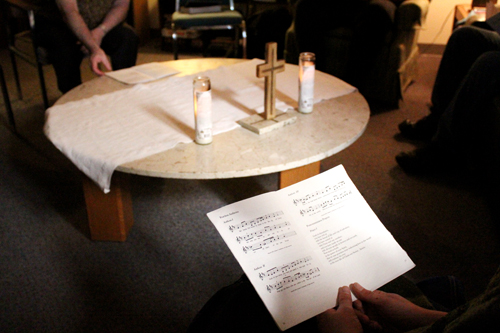We gathered around a table, broke bread, drank wine and shared a ceremonial feast. Most of us chose to participate while others chose to simply watch and learn. Then we chatted all night about a chapter, or “step,” from Karen Armstrong’s 2011 book Twelve Steps to a Compassionate Life.
Building the beloved community

We gathered around a table, broke bread, drank wine and shared a ceremonial feast. Most of us chose to participate while others chose to simply watch and learn. Then we chatted all night about a chapter, or “step,” from Karen Armstrong’s 2011 book Twelve Steps to a Compassionate Life.
Campus minister Carol Joy Brendlinger and campus Episcopal minister Reverend Dennis J. Parker lead these group discussions every Thursday afternoon at the Spiritual Life Center, located across street from Cramer Hall on Montgomery. People of many different religions are invited to attend.
The group discussions focus on different books each quarter. Joseph Boyd, lay minister of the First Unitarian Church of Portland and coordinator for the campus ministry recommended Armstrong’s book, which talks about creating a “beloved community.”
“Boyd was really interested in exploring how we build that community, especially the ‘beloved community’ that the gospels talk about, where everyone is welcome regardless of class or race or gender or orientation or any of those things we normally separate ourselves into in the Christian tradition,” Parker said.
The group discussions begin with a Christian communion ceremony. Brendlinger and Parker encourage but do not require everyone to participate in this ceremony.
“We have Joseph, who’s Unitarian Universalist, we do have a Jewish woman who’s been coming off and on, another woman who identifies as pagan,” Brendlinger said. “Some people come every week, some people just drop in and never come back but really participated when they came—it’s just part of that rhythm here at PSU.”
This Thursday, the group discussions continue with the eighth step, “How Should We Speak to One Another?” Typically, a volunteer summarizes the step, and the group members share stories from their daily lives that apply to that step. Parker summarized the steps taken thus far:
“The first step is learning that compassion is more than just feeling sorry for someone else. The second step is compassion for the way we find ourselves. The fourth step [is] seeing yourself in the other. The sixth step [is] planning how to implement that understanding. The seventh step [is] to really know what we don’t know.”
Armstrong, a Catholic nun, believes that all religions share the golden rule as a common theme. “Do not do unto others as you would not like them to do to you,” Armstrong writes.
Brendlinger has ministered at the university since fall 2005. She belongs to the West Hills Friends Meeting of the Quaker tradition. Quakers prefer the term “meeting” rather than “church” to indicate a gathering of people instead of just a building.
Parker has a background in artistic theater but became interested in issues of social justice. Ordained 10 years ago, he came to PSU not knowing what to expect. Parker spends half of his time at St. Stephen’s Catholic Church in Southeast Portland and the other half at the campus ministry. He tries to emphasize a more liberal, inclusive and less judgmental view of Christianity in particular and religion in general.
“The gospel itself is not about judgment, not about punishment. It’s not about a God who marks up the rights and wrongs you do and decides what happens to you at the end of your life,” Parker said. “We are created to be in God’s image, so in that image is our freedom from the world that wants to judge us and separate us and from the religious system that builds itself around judgment and punishment and forgiveness of sin and how the Christian message has been really distorted by that.”
Parker and Brendlinger seek to deemphasize the differences between different traditions, both Christian and non-Christian—to unify people of different traditions with a concern for issues of social justice.
“There’s so many marked differences between the way the more evangelical churches view the gospel as opposed to the way the more progressive churches see it,” Parker said. “So I’m providing an alternative voice for those folks who don’t necessarily want to identify with a Christian church that has an emphasis on a more dogmatic and judgmental faith.”
Beloved Community, Building an Interfaith Community of Compassion
Current topic: Karen Armstrong’s Twelve Steps to a Compassionate Life.
PSU Spiritual Life Center
633 SW Montgomery St.
Thursdays
5:30 p.m.
Free and open to the public






